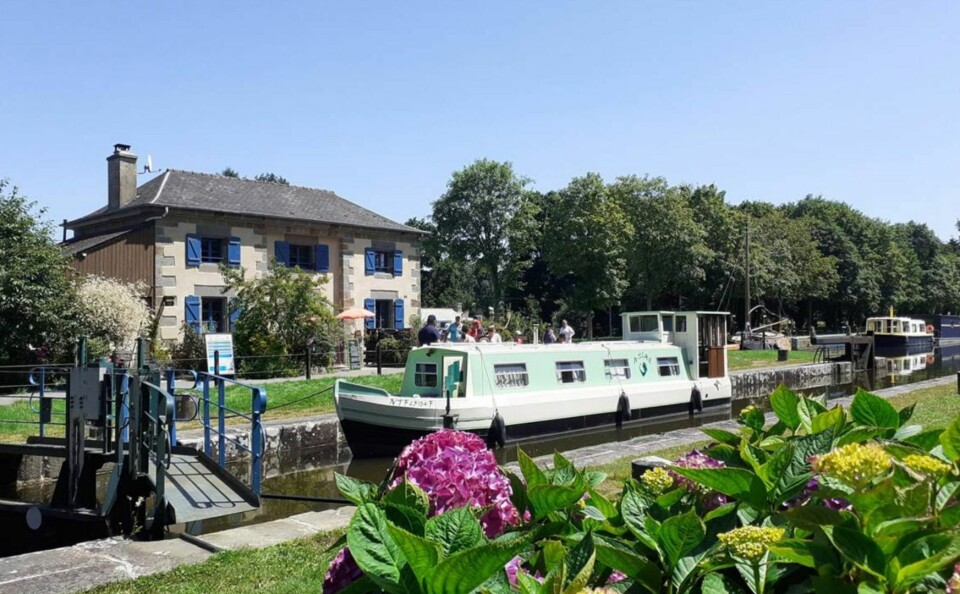-
French ski resorts report excellent Christmas despite less snow than last year
Bookings are up and non-snow related activities are also on the rise
-
Charging non-Europeans more to visit Louvre is discrimination, says major French union
Admission fees have also risen at other French key cultural sites
-
Normandy once again named ‘Most Desirable Region in Europe’
Northern France’s historic spot voted top by leading UK travel magazine readers
Low-rent lock houses in Brittany offered to tourism entrepreneurs
The state-owned canal properties were empty until offered to businesses to boost tourism - an owner shares her ‘warts and all’ story

Entrepreneurs are taking over lock houses and stretches of canal bank in return for low rents in a project to boost the tourist potential of Brittany’s old waterways.
The scheme started in 2013. Local government changes meant the Brittany regional council became responsible for canals in the area, many of which have not been used commercially for many years, but which still boast working lock systems.
Read more: Largest ever Brittany flag displayed in call for more local power
Maintain heritage and boost local economy
In the old days, each lock would have its own lock-keeper, responsible for helping boats navigate through and maintaining the lock infrastructure.
Now it is no longer necessary to have a keeper at each house – pleasure boats either operate the locks themselves or rely on the services of mobile lock-keepers who travel between sites in cars and vans.
In total, there are 156 lock houses on the 440km of canals in Brittany.
Read more: ‘€8,000 barge in France gave us an off-grid retirement’
Véronique Gonzalez, in charge of tourism services at Redon Agglomération which runs the scheme, said: “People love being next to the water, so keeping paths open and developing tourism makes a lot of sense.
“This is one way of making use of the heritage we have, as well as providing people with the opportunity to have businesses which they might not otherwise have.”
The region remains the legal owner of the lock houses and the canal and its banks, and is responsible for basic maintenance, including walls, roofs and sewerage systems.
Everything else must be paid for by the successful bidder, who benefits from low rents and a guaranteed right of occupation for 10 years.
Shining example between Rennes and Saint-Malo
One of the stars of the first round of the project is the Ille Flottante sleep-on-a-boat business, developed by Catherine Saint-James and her musician husband Guillaume.
It is on the Canal d’Ille-et-Rance, on the outskirts of the village of Hédé-Bazouges, between Rennes and Saint-Malo.
The couple took over a lock house and moorings with the idea of living in the house themselves and having people stay on boats on the canal.
They originally used specially-built wooden boats from the Loire, but these were sold after a couple of years due to the maintenance required.
They were replaced with ‘themed’ craft, including a cabin cruiser, a narrowboat, a converted barge, a ‘yellow submarine’ houseboat and a sailing boat.
The couple also run a bar and cafe, organise jazz concerts, and hire out bicycles and small motor boats.
More recently, they have converted the stables, originally used by canal horses to pull the boats, into accommodation, and last year took over a second, neighbouring, lock house to expand the business.
Arrangement not without problems
“We lived in the village and realised the potential of the site,” said Ms Saint-James.
“When the region decided to make use of the lock houses, we knew it was something we could do, and we are proud to have made use of them.”
The couple pay €3,000 a year in rent for the whole business and the house, and received guarantees that the 10-year contract would be renewed in 2023 before they started work on the second house.
“Low rent enabled us to spend on the business, but the arrangement does have its problems,” said Ms Saint-James.
“We cannot sell the business when we leave and get no return on the rise in value of the property due to our turning it from a sad, empty house into a thriving tourist and social hub.”
The extreme seasonality of a canal-based tourist business can also be difficult to manage.
“We work very hard from April to October, with four full-time salaries on the business, but for at least five months there is no work, which is a difficult way to live.
“I am thinking of looking for a salaried job in four or five years to have more financial security, and hope to find someone to take over the day-to-day management.
“But we went into this with our eyes open, the project has benefited the area, and I would recommend a similar arrangement for people who think they would like to build up a tourism business on the canal.”
Anyone interested should keep an eye on bretagne.bzh
The latest call for projects has closed, but there might be others in the years to come.
Related articles
‘We sailed to France on a barge and took our time house hunting’
Two Brittany houses sprayed with anti second-home graffiti
Brittany village saves 25% on energy bills with new eco tools
























